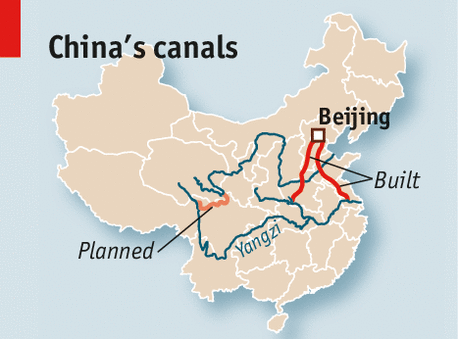(单词翻译:单击)
Vast new waterways will not solve China's desperatewater shortages
即使接通了新的水道,中国的水资源短缺问题依然无法得到解决
Soon the centrepiece of one of China's mostspectacular engineering projects will be completed, with the opening ofsluicegates into a canal stretching over 1,200km(750 miles) from the Yangzi river north to the capital, Beijing. The newchannel is only part of the world's biggest water-diversion scheme. More than300,000 people have been kicked out to make way for the channel and theexpansion of a reservoir in central China that will feed it. But the governmentis in a hurry, and has paid their complaints little heed.
很快,中国最宏伟工程之一的主要部分即将完成,届时扬子江的河水将流经1200公里抵达北京。这条水道还仅仅是这整个宏伟项目的一部分。这条水道的挖掘以及其水源地中国中部一个水库的扩张导致30万人搬迁。但是政府很着急,所以对人们的抱怨不管不顾。

China's leaders see the so-called South-North WaterDiversion Project, which has already cost tens of billions of dollars, ascrucial to solving a water problem that threatens the country's development andstability (see article). Grain-growing areas around Beijing have about as much water perperson as such arid countries as Niger and Eritrea. Overuse has causedthousands of rivers to disappear. The amount of water available is diminishingfast as the water table drops and rivers dry up; what little is left is oftentoo polluted even for industrial use. The World Bank has said that China'swater crisis costs the country more than 2% of GDP, mostly because of damage tohealth. The new supply's arrival in Beijing will thus come as a huge relief toofficials. Indeed, so desperate is the lack of water that some have in the pastsuggested such drastic answers as moving the capital.
为了解决可威胁经济发展和稳定的水资源问题,中国领导人将这个耗资巨资的南水北调工程看成是解决问题的关键。北京周边地区的粮食产地其人均水资源相当于干旱国家尼日尔和厄立特里亚国的水平。水资源的过度使用使得大量河流干涸。随着地下水位的下降和河流的干涸,可用的水资源在不断减少;而那些没干涸的河流,由于污染严重,连用来进行工业生产都不合格。世界银行称中国的水危机使中国的DGP损失了2%多,主要是卫生健康上的危害。因此,即将抵达北京的这些水资源将官员松一口气。确实如此,北京的水资源是如此的缺乏,过去还有人建议迁都。
Yet China's water problem will remain unsolved. Thecanal is the second leg of the diversion project; the first, which opened lastyear in eastern China, brings water from the south along the route of the oldGrand Canal, built 1,400 years ago, to the northern plain. Neither will provemore than temporary palliatives as demand continues to soar and pollutionremains widespread. China's water crisis cannot be tackled by showymega-projects. Misguided policy is as much to blame as a mismatch in supplybetween the water-rich south and the arid north. A new approach to watermanagement, rather than more concrete, is needed.
然而,中国水问题依然无法得到解决。该水道是南水北调工程中的第二条;第一条于去年在中国东部开通,沿着1400年前所建的大运河的路线将南水北调。这些措施都只能暂时缓解北方水资源的缺乏,因为需求在不断增加,污染也依然广泛。中国的水危机靠这些大工程是无法解决的。南方水资源多,北方水资源少,这是自然资源的不协调分布,而被误导的政策同样是导致中国水危机的原因之一。所以需要采用新的方法对水资源进行管理,而不仅仅是工程建设那么简单。
Send them the bill
给他们寄去账单
The solution is simple: China needs to price itswater properly. Prices have risen a bit recently, but even in places wherewater is scarce it is ridiculously cheap, and as a result there is colossalwaste. Beijing is ringed with water-hungry golf courses for the elite.Householders are scarcely aware that water has a value. Planners fail to takethe cost of water into account, so provincial governments enticewater-intensive firms to invest in desert areas and officials designatedrought-prone regions as the sites of vast new cities. Raising the price ofwater in places where it is in short supply would discourage investment in suchareas.
问题的解决很简单:中国要给水资源进行适当的定价。水的价格最近涨了一点,但是即使是在水资源严重缺乏的地区,水的价格还是非常低廉,因此导致了巨大的浪费。北京有为精英们服务的水需求量巨大的高尔夫球场。家家户户很少意识到水的价值。规划者没有将水的成本计算进去,于是省政府就吸引耗水量大的企业到沙漠地区投资,还在易干旱地区建造巨大的新城。在水资源稀缺的地区提高水价就可以避免人们在这里大量投资。
The Maoist obsession with food self-sufficiencycompounds the problem. The arid northern plain, home to 200m people, produces water-hungry crops such as wheatand corn. Nearly 70% of water consumed in the area is used for agriculture. Itis time for China to abandon autarkic thinking and import more food.
粮食自给自足的毛泽东主义也加剧了这一问题。两亿人口的干旱北方平原生产耗水量大的小麦和玉米。该地区几乎70%的水都用于农业灌溉。所以中国是时候抛弃自给自足的思想并更多的进口食物了。
Last year the Communist Party pledged to let marketforces play a decisive role in allocating resources such as water, land andelectricity. If it did so in the case of water, it would reap many benefits.Development would become more environmentally friendly, China could devote itscapital and remarkable engineering skills to projects more productive thanshipping water around the country—and everybody would save a great deal ofmoney.
去年,中共承诺将让市场力量在资源的分配中扮演决定性的角色,比如水,土地和电力。如果真的在水资源方面履行这样的承诺的话,那将有很多的好处。经济发展将变得更加的环境友好,中国就可以把自己的资本和工程技术投在更加具有效益的项目中去,而不是将水全国运输——这样各方都能省下一大笔钱。


